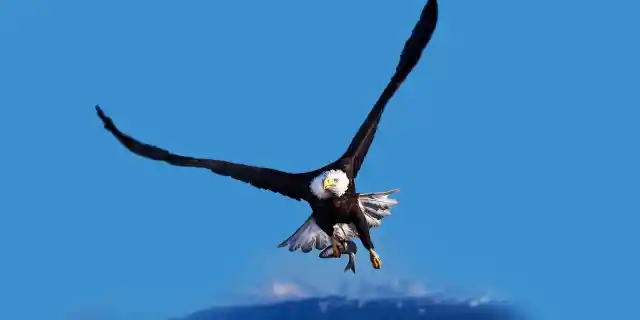

Welcome to the second and final part of our list of eagle facts! Hopefully, the first part of this list was enlightening, and there’s much more to come! Check it out for yourself below.
Number Seven: Eagles Often Have Two Eggs, But Only One Surviving Child. This is because the older of the two babies will often attack and kill its younger sibling. And the parents of the children will not interfere with this seemingly brutal behavior. Life is tough as an eagle kid.
Number Six: Eagles Are Stronger Than Planes. Or at least, their wings are. Relative to their size, their wings actually contain more power and strength than the wings of an airplane.
Number Five: Fledglings (Young Eagles) Leave the Nest Weeks After Birth. After nine or ten weeks of life, young fledglings leave the nest their parents created for them. Their parents will also force them to fly prior to this to prepare them for life outside the nest.
Number Four: Eagles Will Perform Tricks to Attract Mates. They have been known to perform acrobatic and elaborate aerial tricks and maneuvers to attract eagles of the opposite sex. This behavior is also sometimes done to let other birds know that a certain area is that eagle’s territory.
Number Three: Eagles Have Longer Wingspans Than the Average Human Height. The longest wingspan belongs to the Philippine Eagle, with a wingspan of 7 feet, 3 inches. This is taller than almost every player in the NBA, much less the average person on the street. But even smaller varieties can have wingspans of over 6 feet.
Number Two: Lifespans Vary From Eagle to Eagle. The American bald eagle has one of the longest lifespans for its species and can live up to twenty years. But other varities live for shorter amounts of time: the Crowned Eagle, for example, only lives up to fourteen years.
Number One: Some Eagles Attack Monkeys. The Harpy Eagle is one of the largest varieties on earth and lives in rain forests throughout Central and South America. It is known to attack monkeys out of trees – including Spider Monkeys and Howler Monkeys – and feast on them once they’ve fallen.